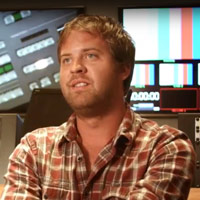The Digital Filmmaking program prepares students for an exciting and challenging career in narrative video production. Course work gives students the opportunity to lead a team, develop entry-level skills required by media and production houses, and create their own production business. The writing/directing curriculum focuses on directing crews and talent, screenwriting, cinematography, essential video editing and sound design, production management, and basic film marketing. The production design emphasis centers on collaborative art design and direction, video editing, audio mixing, special effects compositing, basic multimedia marketing graphics and event coordination.
Why choose the Digital Filmmaking program at CMU Tech?
- Training focuses on current production needs, diverse learning styles, hands-on classroom experience and practical program-related work
- Small class sizes ensure students receive the level of instruction needed to be proficient in a media production environment
- Students learn general production management and marketing practices
- A flexible curriculum includes several one-semester technical certificates
The Associate of Applied Science Digital Filmmaking with a writing/directing emphasis prepares and develops students for entry-level jobs in the film, broadcast and commercial video industries. Digital Filmmaking - Writing/Directing is about storytelling with production to relay facets of experiences to audiences. During this program, students will cover the in-depth fundamentals of screenwriting, planning and filming productions, and implementing essential post-production to present the story. Students will also use common research skills, collaboration, actors, lighting and sound, and non-linear editors and video/graphic compositors. Plus, students learn not only the filmmaking business but information they can use if they want to become freelancers.
Academic Requirements for Associate of Applied Science in Writing/Directing, Digital FilmmakingThis Digital Filmmaking Writing/Directing Elements certificate helps prepare students with the foundational skills needed for entry-level careers in the film, TV and commercial video industries.
Academic Requirements for Technical Certificate in Writing/Directing Elements, Digital FilmmakingThis Digital Filmmaking Intermediate Writing/Directing certificate helps prepare students with the intermediate skills needed for entry-level careers in the film, TV and commercial video industries.
Academic Requirements for Technical Certificate in Intermediate Writing/Directing, Digital FilmmakingThis Digital Filmmaking Basic Writing/Directing certificate helps prepare students with the basic skills needed for entry-level careers in the film, TV and commercial video industries.
Academic Requirements for Technical Certificate in Basic Writing/Directing, Digital FilmmakingAnimation Principles II delve into the art of traditional animation and the animation production process. In this certificate, students will utilize animation, dynamic drawing, and storyboarding training to conceive fully rendered story-driven animations. The process focuses on setting the pace and preparing students for the rigors of animation and, most importantly, the structure and process of animation production. Intermediate animation techniques are explored and utilized in projects to create greater depth of character performance, render stylized backgrounds, and add voice acting and sound design to their productions. At the end of the certificate, the student will have a workable animation piece for their portfolio.
Academic Requirements for Technical Certificate in Animation Principles IIAnimation Principles I delves into the art of traditional animation and the animation production process providing students with a solid animation foundation. The curriculum is designed to foster experiential learning and project-based results, equipping students with practical skills. By focusing on foundational and traditional animation techniques, students gain a comprehensive understanding of animation theory and application. This robust foundation serves as a springboard for careers in traditional animation, 3D animation, video game design, social media, and augmented reality design, instilling a sense of readiness and confidence in our students.
Academic Requirements for Technical Certificate in Animation Principles IThe Drone Cinematography Certificate program is designed for individuals seeking to enhance their skills and knowledge in the dynamic field of aerial cinematography. This comprehensive program covers various aspects, including cinematography techniques, short-form production, documentary filmmaking, and freelancing for creative projects. Participants will gain hands-on experience with industry-standard equipment, receive expert instruction, and develop a versatile skill set applicable to the rapidly evolving world of visual storytelling. The focus of this certificate will be on cinematography, production, and post-production skills and not a substitute for Part 107 training. A CMU Tech Small UAS Certificate or a Part 107 FAA Certificate as a pre-requisite to this program is required.
Academic Requirements for Technical Certificate in Drone CinematographyCareer Opportunities
- Independent film producer/director
- Cinematographer
- Screenwriter
- Art director
- Storyboard artist
- Video editor
- Visual effects artist
- Audio designer
Career Pathways
Career pathway programs prepare students for employment in industries while also providing a stepping stone to an associate degree, bachelor’s degree and beyond.
| Career Pathways Certificate | Length of Program |
| Writing/Directing Elements | 1 semester (12 credits) |
| Basic Writing/Directing | 1 semester (13 credits) |
| Intermediate Writing/Directing | 1 semester (7 credits) |
| Production Design Elements | 1 semester (12 credits) |
| Basic Production Design | 1 semester (12 credits) |
| Intermediate Production Design | 1 semester (9 credits) |
Student Work
Our goal at CMU Tech is to make sure our graduates can go out into the business community and perform. From day one, students get hands on experience with the equipment and technology, and gain experience in writing, directing and production design. Students often work with real clients from the community to create a final product.
Check out some of our student work.

